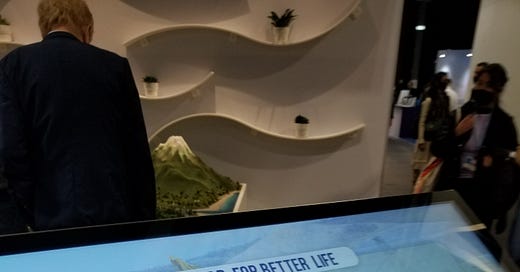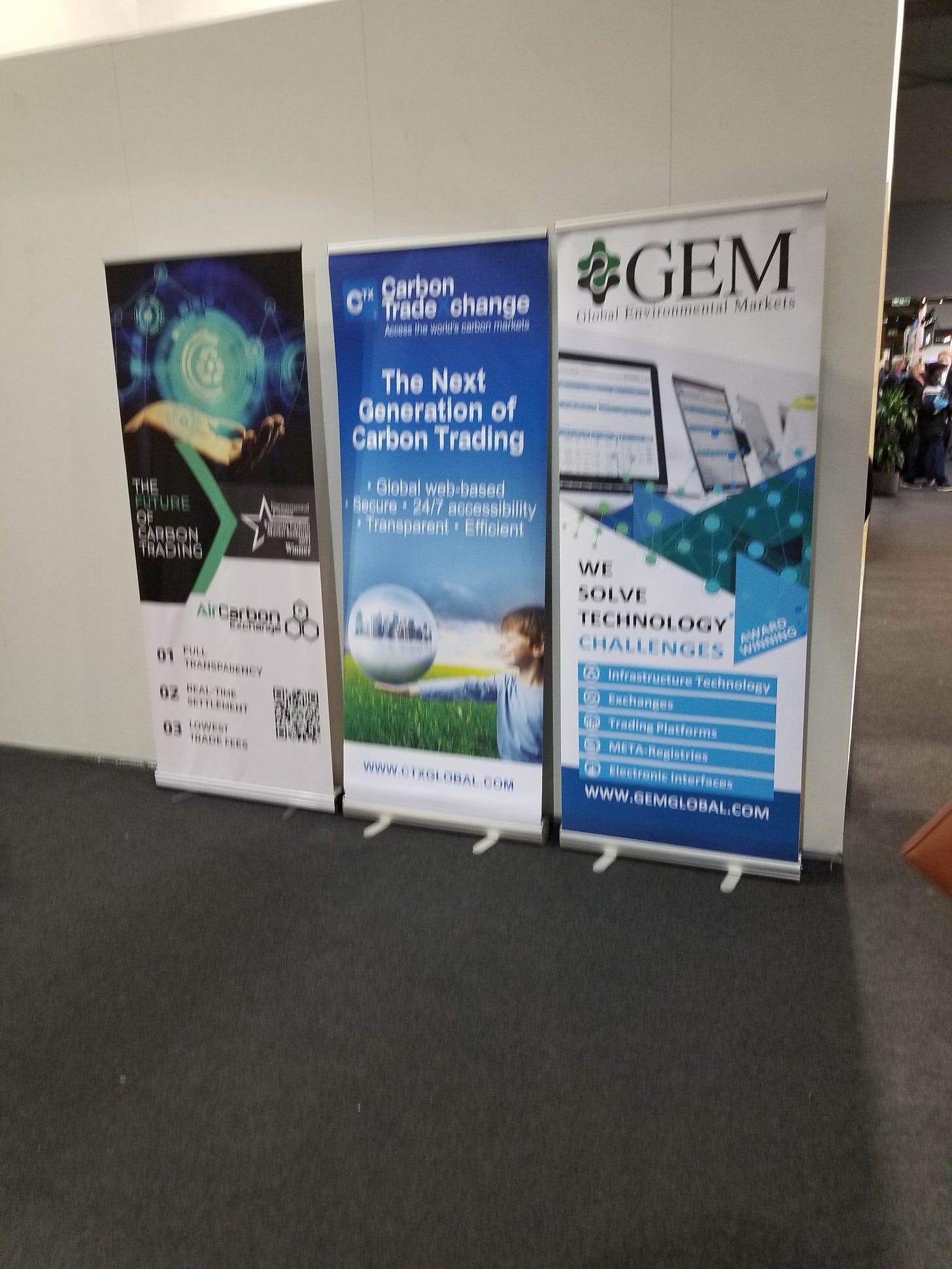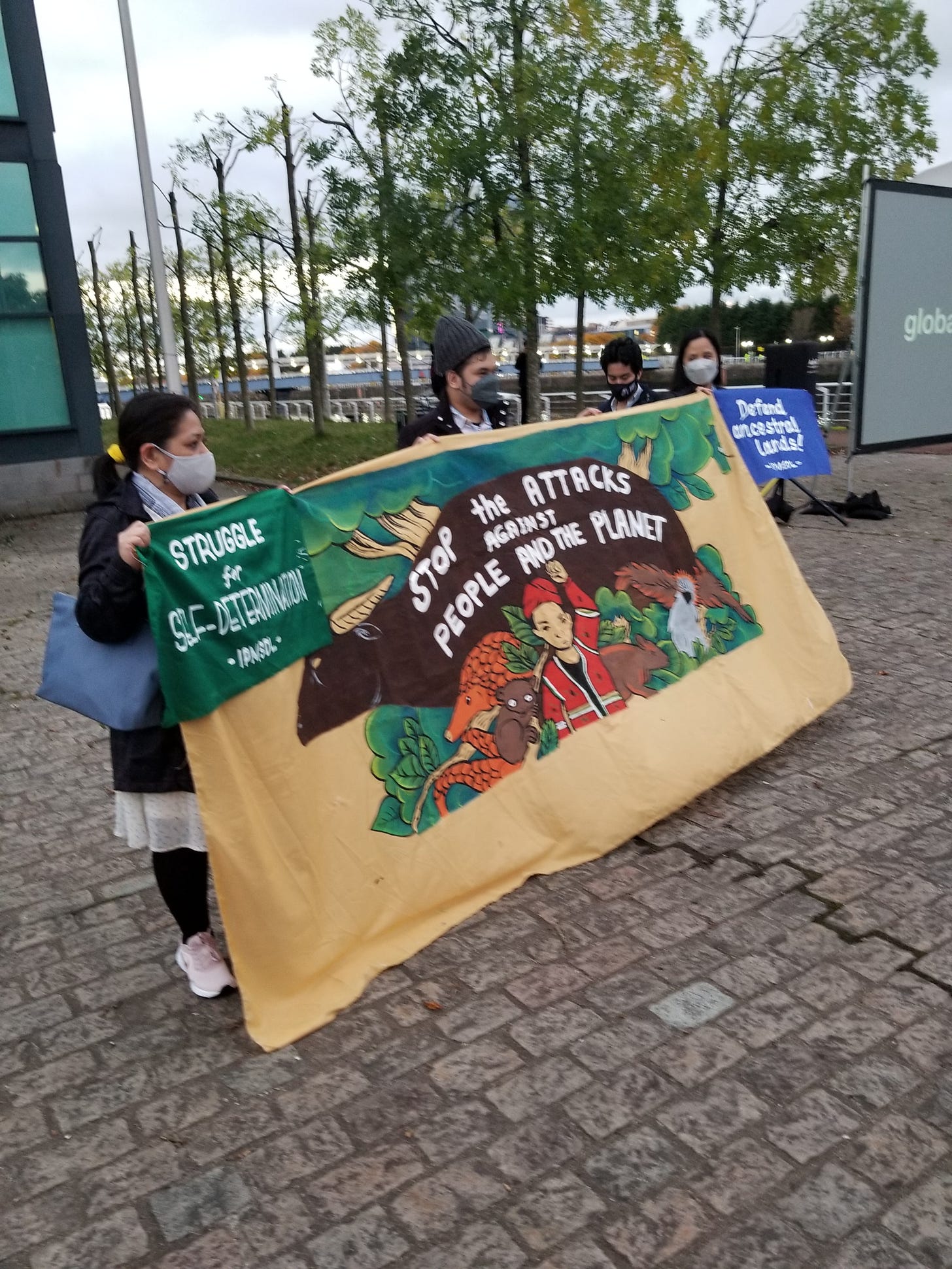The Climate Summit is Mostly Banal--With Moments So Deep You Walk Away In Tears
One day amidst the chaos
COP26 in Glasgow—like all the climate summits before it—resembles nothing so much as a shoe convention or a furniture convention. Not an auto show, because those are glamorous (though there is one electric racecar on display in the middle of the Glasgow conclave).
(Might you be willing to subscribe to this newsletter? My share of the subscription revenues will go to help launch Third Act, our new progressive organizing campaign for those of us over the age of 60)
I can prove it with pictures. In a few hundred square yards you can look at the Russian nuclear pavilion (“nuclear for a better life”)
or the display of the Kingdom of Saudi Arabia, which has worked hard to weaken every climate treaty
or perhaps you’d like some tips on the latest ways to profit from carbon trading
All of this somehow relates to the fight to save the planet, but it’s always depressingly clear that it’s also become a routine, an industry, an ongoing enterprise largely divorced from the scientists and activists who forced this process into existence.
On its fringes, however, there are occasionally events that take your breath away.
I walked across the bridge over the River Clyde to a spot just opposite the convention center this afternoon, observing (and observed by) five long-necked swans who flew overhead. My destination was a small patch of riverbank, where some activists were preparing a memorial moment for environmental activists who had been killed in the year past—227 of them, defending tropical forests or the sites where some corporation thought a mine should go. I’d written the foreword to the annual report that a group called Global Witness produces each year cataloguing these deaths—it had been a fraught week reading through all the accounts, especially because it was so clear that at some level all of us were implicated in their deaths.
They are at risk, in the end, not so much because of another local person who pulls the trigger or plunges the blade; they’re at risk because they find themselves living on or near something that some corporation is demanding. Like Fikile Ntshangase, the South African grandmother who led a spirited campaign against a coalmine in KwaZulu-Natal province and was shot dead in her home last year. Or Óscar Eyraud Adams, the indigenous activist who, during Mexico’s worst drought in 30 years, vocally advocated for his community’s right to water, as the authorities denied them and granted corporations ever more permits. Oscar was shot dead in Tecate last September.
The demand for the highest possible profit, the quickest possible timeline, the cheapest possible operation, seems to translate eventually into the understanding, somewhere, that the troublemaker must go. The blame rarely if ever makes its way back up to a corporation’s HQ. But it should. Especially since the people who inhabit these places never really share in the riches produced there: colonialism is still running strong, even if it’s dressed up with corporate logos or hidden with offshore bank accounts.
These people find themselves at the business end of the great machine that can’t stop itself—the same machine that kills 8.7 million humans a year who die from breathing fossil fuel pollution; the same machine that is systematically raising the temperature of the planet. The same machine that our banks and asset managers and insurance companies keep supporting. The same machine that all of us have profited from in some way or another.
There’s no use feeling guilty. There’s every use standing up against the companies and the system that caused their deaths.
Our activism won’t bring back those defenders of the planet who have been killed, but it’s the least we can do. Yes, many of us are already in the fight, but there’s a big difference between fighting and dying: the names of these activists should be on our lips and in our hearts. We owe them debts that can’t be repaid – only paid forward.
One more picture. It’s not a big fancy booth like Saudi Arabia’s. It’s just a banner some people made, with love.








Beautiful, thank you for a glimpse into the conference experience for those that can't attend!
Our only hope is in stopping that machine- corporate capitalism, or more pointedly corporate colonialism as you lay out so clearly. Thanks for keeping us connected to COP26 with such powerful ‘on the ground’ insights.